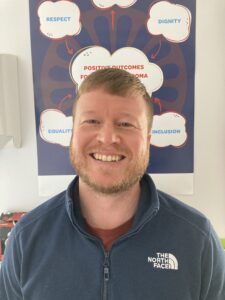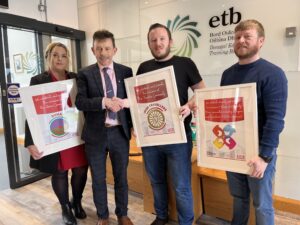 We work in partnership with a wide range of organisations locally, regionally, nationally, and internationally. One such group that we work with locally, within the county is Donegal Travellers Project (DTP). What do they do and how do they work with us? In this blog, DTP’s Education Development Team Lead Barry Mooney tells us more about it.
We work in partnership with a wide range of organisations locally, regionally, nationally, and internationally. One such group that we work with locally, within the county is Donegal Travellers Project (DTP). What do they do and how do they work with us? In this blog, DTP’s Education Development Team Lead Barry Mooney tells us more about it.
Donegal Travellers Project
Founded in 1996, Donegal Travellers Project (DTP) is an independent community development organisation working with, and for Traveller and Roma communities to eradicate the racism, discrimination and inequalities as experienced by both communities across Donegal and Ireland. Working at the grassroots level to affect change locally, regionally, and nationally for over two decades, DTP is underpinned by the core principles and values of community development and works from a human rights framework. DTP has a range of different projects including the Traveller Primary Healthcare Project, Roma Development and Advocacy Project, Northwest Roma Health Initiative, St. Gabriel’s Intercultural Preschool, Domestic Sexual and Gender Based Violence Project, Family Links Project, an Intercultural Training Initiative and an Education Project.
The Education Project
The Education Development Project is a core component within DTP’s Strategic Plan 2021 – 2026 which aims ‘to achieve an inclusive education system and ensure equality of access, participation, and outcomes for and with the Traveller and Roma communities across Donegal. The key actions include:
- Tackle the education disadvantage as experienced by Traveller and Roma communities within the Irish Education System.
- Support the attendance, participation, retention and progression of members of the Traveller and Roma communities in education.
- Provide education and family support in accessing education as well as grinds, post-primary transition programmes and a culturally appropriate afterschool programme for primary school children.
- Promote positive relationships with education providers and families.
- Promote interculturalism and diversity within the Irish education system.
- Link families and children with other relevant services.
Collaboration work with Donegal ETB

In line with the above strategic goals, DTP has worked in collaboration with Donegal ETB on a range of different initiatives including working directly with several ETB schools across the county. Earlier this year we made a presentation to Donegal ETB’s Deputy Principals introducing the Donegal Travellers Project (DTP), with a particular focus on the Education Project. The presentation provided insights into current statistics and the challenges and barriers experienced by Traveller and Roma families, children, and young people in education. During the event, DTP staff and management also presented each ETB school and the ETB building with culturally appropriate posters. These posters, featuring relevant symbols, are designed to create an inclusive environment for Black Minority and Ethnic Groups, including Traveller and Roma communities.
The Education Project also delivered diversity workshops aimed at promoting understanding and inclusion with second-year students from Errigal College, Letterkenny, and first-year students from Finn Valley College, Stranorlar.
We have also worked with Donegal ETB’s Further Education and Training (FET) Service on the Family Links Project along with Donegal County Library to create ‘Storysacks’ which reflect and explore Traveller culture, heritage and traditions through the lived experiences of Traveller women living in Donegal. The ‘Storysacks’ published by Traveller Women are now on display in libraries across the county creating a more inclusive space and recognising Traveller culture and heritage in a public space. You can also listen to them here on Donegal ETB’s YouTube account.
DTP looks forward to working collaboratively with Donegal ETB in the future with the aim of tackling educational disadvantage as experienced by Traveller and Roma communities and advancing the equality of outcomes for Traveller and Roma children and young people.
If you would like to find out more about our education work, visit our website here.
